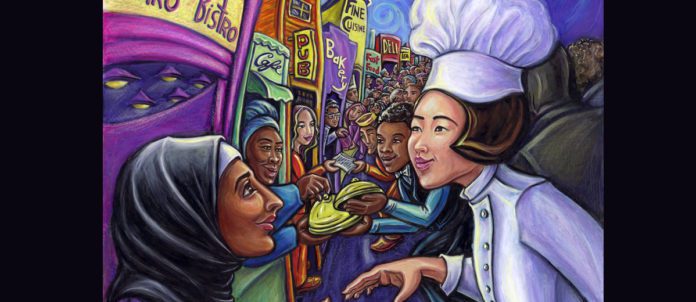Over the past few years, many companies have made significant commitments to their HR policies with the aim of improving diversity and inclusion within the foodservice industry. These commitments have included increased measurement, accountability and transparency around workforce diversity.
David Gibbs, CEO, Yum! Brands, Inc. stated in 2021 that, “2020 marked a turning point for communities and businesses around the world, as the pandemic deepened existing societal issues and inequalities.”
“Since publishing our commitment to diversity in 2020, we’ve made strides to advance our actions,” shares Grace Turiano, senior manager, Internal Communications, Restaurant Brands International (RBI). “We own the outcome of our Diversity and Inclusion (D&I) journey and continue to measure our progress around hiring and representation, diversity in our advertising and in community support.”
Hiring and Recruiting
Though the foodservice-and-hospitality industry traditionally attracts a diverse workforce, that diversity has historically not been reflected in management and leadership roles. This has led many of the industry’s largest companies to publicly set targets in this area.
For example, McDonald’s goals include increasing representation of historically under-represented groups in leadership roles (senior director and above) located in the U.S. to 35 per cent by 2025. It’s also working to increase representation of women in leadership roles globally to 45 per cent in the same period, with the further goal of achieving gender parity in these roles by 2030.
However, there has been ongoing debate surrounding the value of setting D&I targets that prescribe achieving a certain number of diversity hires. The main concerns revolve around tokenism and the risk of placing these targets above employees’ merit and achievements.
In its Commitment to Diversity, RBI specifically calls out meritocracy as a core value of the company, stating: “We believe that you should be hired, promoted and compensated based on what you do and how you do it.” As a result, the company’s commitments focus on changing the way it recruits.
In fact, over the past year, RBI has exceeded its target of “having 50 per cent of final-round interview candidates for any role with RBI be demonstrably diverse,” shares Turiano. Since mid-2020, 70 per cent of final-round candidates globally were diverse, resulting in 62 per cent of all hires through the new process adding to the company’s diversity.
Ian Vickers, Chief Operating Officer of Winnipeg-based Diversity Food Services, highlights connecting to the community and reaching out through channels that will reach marginalized groups as key to diverse recruitment. “By just starting our search there, we end up way ahead,” he says of the strategy employed by the social enterprise, whose vision includes “providing meaningful employment and career development for individuals traditionally marginalized in our economy”.
Beyond creating diverse workforces that reflect the reality of the communities they operate within, ensuring equal opportunity and equal pay are important aspects of eliminating bias. And, this is an area where measurement is especially pertinent.
On this front, Starbucks Canada has committed to achieving “equal pay for work of equal value.” On International Women’s Day 2021, Lori Digulla, president of Starbucks Canada, shared: “I’m pleased to confirm once again this year that Starbucks Canada is pay-equity compliant,” adding, “Our compensation practice also requires each role to have a set pay grade regardless of the partner who fills the position, and we review and validate our pay grades both internally and against external market data annually.”
Franchising
Among the large restaurant franchisors, workforce commitments/targets tend to focus on corporate employees. However, there have also been commitments to franchisee diversity.
Recipe Unlimited’s 2020 Corporate Social Responsibility Report includes a commitment to work with its franchisees to inform and enhance the company’s diversity goals, “including the development of programs to attract and better support diverse franchisees.”
McDonald’s also includes franchisee diversity in its Diversity, Equity & Inclusion strategies. In 2021, the company announced a franchisee-recruitment initiative for McDonald’s U.S. and all McDonald’s International Operated Markets (including Canada) with the goal of helping to increase the number of franchisees from historically underrepresented groups.
Last year, Yum! also launched the Yum! Center for Global Franchise Excellence at the University of Louisville. A key focus of this first-of-its-kind education and research centre is educating under-represented people of colour and women on the possibilities of franchising as a pathway to entrepreneurship.
On the Ground
While large chains play a significant role in the industry, it’s important to acknowledge that small foodservice operators do not have the resources or scale to approach D&I the way big franchisors have. As foodservice operations often lack formal human-resources departments, these issues have long been a challenge.
However, Vickers shares that policies and targets are not the only way to achieve an inclusive culture. “We’re not a policy-driven company, we are a culture-driven company,” he explains. “We start off with that underlying idea that we’re going to pay the true value of products all the way along the supply chain — inclusive of our own people.” And, through this holistic approach, he says, “we sort of bake that equity and inclusion piece into the recipe right from the start.”
This approach is centred on inviting everyone to the table and valuing each team member and their unique perspective through a culture of “participative management.” (This is evident in the company’s menus, which feature family recipes from employees past and present.)
There are also external resources that operators can leverage to aid the development of inclusive workplace culture, including training and accreditation programs and collective commitments.
Kostuch Media Ltd. has formed an Anti-Racism Framework in partnership with Easton’s Group of Hotels, which is intended to help the foodservice-and-hospitality industry create a more equitable and just workplace, while also ensuring that diversity and inclusion are part of the fabric of their businesses. Companies can sign this commitment document stating their intention to “actively support a culture of anti-racism equity and inclusion for all.”
By Danielle Schalk


















